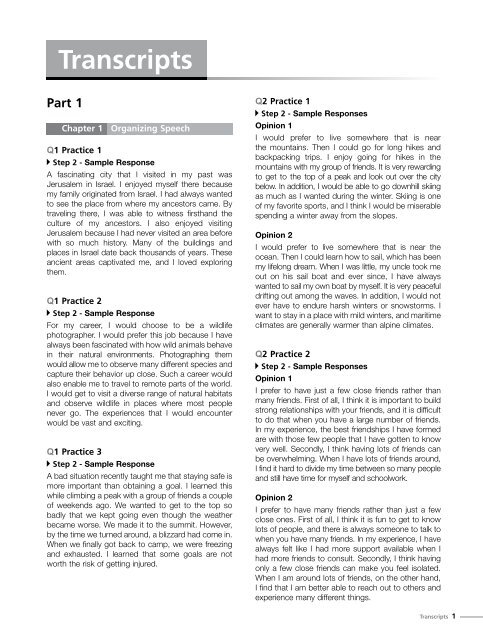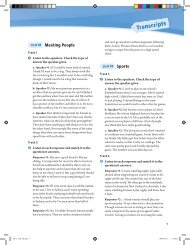Mastering Skills for the TOEFL iBT 2nd - Speaking
Mastering Skills for the TOEFL iBT 2nd - Speaking
Mastering Skills for the TOEFL iBT 2nd - Speaking
You also want an ePaper? Increase the reach of your titles
YUMPU automatically turns print PDFs into web optimized ePapers that Google loves.
how sports teams often paint <strong>the</strong>ir opponents’ lockerrooms <strong>the</strong> warm color, pink. They do this in hopesthat <strong>the</strong> pink color will be so com<strong>for</strong>ting that <strong>the</strong>iropponents will lose energy. The professor <strong>the</strong>n mentionsthat people are often advised to wear blue suits to jobinterviews and new jobs so that <strong>the</strong>y seem moreconfident.This is important <strong>for</strong> baboons on <strong>the</strong> savanna becausefood is rarer. There<strong>for</strong>e, according to <strong>the</strong> professor, astrong dominant leader needs to be in control tomanage resources and aggression. Conversely, <strong>the</strong>professor explains that <strong>the</strong> role of <strong>the</strong> dominant malein <strong>for</strong>est baboon groups is less defined because food<strong>the</strong>re is more common.Q4 Practice 2Step 2 - LectureW: A baboon is one type of animal that uses a highlystructured dominance hierarchy. Let’s take acloser look at just how baboons use dominancehierarchies within <strong>the</strong>ir social groups.First off, dominance hierarchies in <strong>the</strong> baboonspecies are used to keep <strong>the</strong> group organizedand stable. This is done through a ranking system.Each baboon in <strong>the</strong> group has a specific rank.Those in lower ranks follow <strong>the</strong> leadership ofthose in higher ranks. For example, baboons in agroup follow <strong>the</strong> leadership of a dominant male.This individual makes major group decisions—like where to find food—and <strong>the</strong> lower rankedmembers follow his lead. This allows dominantindividuals to make quick decisions about what’sbest <strong>for</strong> <strong>the</strong> entire group, which could mean <strong>the</strong>difference between survival and death.Dominance hierarchies also allow baboons tosettle disputes over scarce resources. This isimportant <strong>for</strong> baboons that live on <strong>the</strong> Africansavanna. On <strong>the</strong> savanna, food is often scarce.There<strong>for</strong>e, a dominant individual exists who canmanage aggression and determine how food isdistributed. However, baboons that live in <strong>the</strong><strong>for</strong>est have a more relaxed dominance hierarchybecause food is more available. Conflicts overfood are less likely to occur here, so <strong>the</strong> role of<strong>the</strong> dominant male in <strong>for</strong>est baboon groups is notas clearly defined as that of a savanna baboon’s.Step 4 - Sample ResponseThe reading says that dominance hierarchies exist tomaintain order and resolve conflicts in animal groups.The professor discusses how baboons use dominancehierarchies to maintain order through a ranking system.There is a dominant male baboon in each group, and<strong>the</strong> lesser ranked baboons follow what he does. Theprofessor <strong>the</strong>n says that dominance hierarchies helpbaboons manage conflicts over scarce resources.Q4 Practice 3Step 2 - LectureM: Wegener first noticed that <strong>the</strong> continents seemedto fit toge<strong>the</strong>r like a jigsaw puzzle. When you lookat a map of <strong>the</strong> world, you can see a fit between<strong>the</strong> eastern coast of South America and <strong>the</strong> westerncoast of Africa. But this realization wasn’t enoughto prove his hypo<strong>the</strong>sis of continental drift. However,scientists have found additional evidence whichproves that Wegener’s hypo<strong>the</strong>sis is accurate.One type of evidence involves fossil records.Scientists have found fossils of ancient animalsdistributed widely across <strong>the</strong> continents, indicatingthat <strong>the</strong> land masses must have been joined atsome point in prehistory. For instance, fossil remainsof one of <strong>the</strong> first marine reptiles, known asMesosaurus, have been found in both SouthAmerica and Africa. This suggests that Africaand South America were once part of <strong>the</strong> samecontinent.It’s also true that <strong>the</strong> geology of <strong>the</strong> SouthAmerican and African coasts is remarkably similar,lending fur<strong>the</strong>r evidence to Wegener’s hypo<strong>the</strong>sis.When you fit <strong>the</strong> two continents toge<strong>the</strong>r, you cansee that distinct rock <strong>for</strong>mations and mineraldeposits match up. For example, <strong>the</strong> same typeof sandstone hills that end on <strong>the</strong> west coast ofAfrica can be found on <strong>the</strong> east coast of SouthAmerica. This same type of sandstone occursnowhere else in <strong>the</strong> world so clearly. Obviously,<strong>the</strong>se continents were connected at one time.Step 4 - Sample ResponseThe passage first defines continental drift, which saysthat <strong>the</strong> continents were once one landmass thatbroke apart and are now drifting away from eacho<strong>the</strong>r. It states that evidence of continental drift canbe found through fossils and rock <strong>for</strong>mations. Theprofessor explains how scientists have come acrossfossils of an ancient marine reptile in both SouthAmerica and South Africa. This led scientists to believe4 Transcripts
W: Well, we’ll be on <strong>the</strong> mountain trail. There’s lots oftrail signs up <strong>the</strong>re. But I can sympathize withyou. I’d be anxious about getting lost, too. Couldyou explain <strong>the</strong> situation to Professor O’Leary?Maybe he’d give you an extra credit assignmentto make up <strong>for</strong> it.M: Possibly. However, I’m not sure if he’ll agree tothat or not.Step 3 - Sample ResponsesOpinion 1The man has to visit his grandfa<strong>the</strong>r in <strong>the</strong> hospital,and he will not be back in time to go on a field tripwith his class on Friday. The trip is a big part of hisgrade. The woman suggests that he ei<strong>the</strong>r meet upwith <strong>the</strong> class Saturday morning or ask <strong>the</strong> professor<strong>for</strong> an alternative assignment. I think it would bebetter <strong>for</strong> him to catch up with <strong>the</strong> group on Saturday.Since <strong>the</strong>re are lots of signs to help him find out whereto go, he should be able to locate <strong>the</strong> class easily.Also, he will not have to worry about whe<strong>the</strong>r or not<strong>the</strong> professor will allow him to do an alternativeassignment. It is too risky to depend solely on <strong>the</strong>professor’s kindness.Opinion 2The man has to visit his grandfa<strong>the</strong>r in <strong>the</strong> hospital,and he will not be back in time to go on a field tripwith his class on Friday. The trip is a big part of hisgrade. The woman suggests that he ei<strong>the</strong>r meet upwith <strong>the</strong> class Saturday morning or ask <strong>the</strong> professor<strong>for</strong> an alternative assignment. I think it would be better<strong>for</strong> him to ask his professor <strong>for</strong> an alternative assignment.Since this is an emergency, his professor will probablyallow him to do ano<strong>the</strong>r assignment. Also, <strong>the</strong> manwill not have to worry about getting lost. It is too riskyto try and find his way around as he does not know<strong>the</strong> area well.Q5 Practice 3Step 1 - ConversationM: So, have you applied <strong>for</strong> student housing yet <strong>for</strong>next year?W: Yeah, I applied to live in <strong>the</strong> West dorms. Whatabout you?M: I haven’t applied yet. I’m having trouble with <strong>the</strong>costs. I just don’t have enough money left over toaf<strong>for</strong>d to live on campus. But I have to find someway to live in <strong>the</strong> dorms.W: Do you have any ideas on how to raise <strong>the</strong> money?M: That’s what I’m worried about. I can’t get aregular job because I have a heavy course load.My schedule’s really busy.W: Have you thought about getting a work-studyjob?M: A work-study job?W: Yeah. It’s where you work <strong>for</strong> <strong>the</strong> university. Inexchange, <strong>the</strong>y’ll pay off some of your livingexpenses.M: Oh, yeah. I know some people who do that.W: The best thing is, <strong>the</strong>ir hours are really flexible.You could probably work it around your heavyclass schedule.M: Hmm . . . that’s definitely an option. I’d still haveto work, though. I don’t know if I can manageboth work and school.W: Or you could always take out a loan. That wayyou wouldn’t have to worry about working at all.You could just concentrate on school.M: That’s true. Of course, <strong>the</strong>n I’d have to worryabout paying it back after I finished school. That’sa lot of debt.W: Well, you’ll just have to decide what will workbest <strong>for</strong> you.Step 3 - Sample ResponsesOpinion 1The woman needs to live on campus to go to school,but she cannot af<strong>for</strong>d to live in <strong>the</strong> dorms. The mansuggests that she get a work-study job or that shetake out a loan. I think she should get a work-study job.It will be better to pay costs off now than later, in myopinion. This option will give <strong>the</strong> woman <strong>the</strong> money tolive on campus without going into debt. She will nothave to worry about paying back a loan when shegraduates. In addition, with a work-study job, she willbe able to work around her own schedule. This way,<strong>the</strong> woman will not have to worry about missing classor getting behind on her schoolwork.Opinion 2The woman needs to live on campus to go to school,but she can’t af<strong>for</strong>d to live in <strong>the</strong> dorms. The mansuggests that she get a work-study job or that shetake out a loan. I think she should take out a loan. Itwill give her <strong>the</strong> money to live on campus withouthaving to work. This option will allow <strong>the</strong> woman toconcentrate more on her schoolwork. She will nothave <strong>the</strong> added stress of maintaining a job and aheavy course load. In addition, taking out a loan will6 Transcripts
Transcriptsalso allow her to pay <strong>for</strong> housing at <strong>the</strong> beginning of<strong>the</strong> semester. This way, she will not have to wait untilshe gets money from working during <strong>the</strong> school year.Q6 Practice 1Step 1 - LectureM: Today I want to talk about minimalism—a prominentmovement in American and European art—whichemerged around <strong>the</strong> 1960s. The idea of minimalismwas to reduce a work of art to its minimum numberof colors, shapes, lines, and textures. Minimalistartists resisted <strong>the</strong> traditional idea that art had torepresent an object or an experience. Instead, <strong>the</strong>ycreated paintings and sculptures that were uniqueobjects unto <strong>the</strong>mselves—objects that didn’tstand <strong>for</strong> something else. To achieve this effect,minimalist artists used two design techniques in<strong>the</strong>ir art.First, <strong>the</strong>y tended to use materials that wereuni<strong>for</strong>m in shape. Take, <strong>for</strong> instance, Carl Andre’s1969 sculpture “Steel Zinc Plain.” This is a perfectexample of how minimalist artists chose <strong>the</strong>simplest, most uni<strong>for</strong>m shapes to piece toge<strong>the</strong>ra work of art. Andre uses one of <strong>the</strong> very simplestof geometric structures: <strong>the</strong> square. He tooksquare plates of zinc and square plates of steeland arranged <strong>the</strong>m in a checkerboard pattern on<strong>the</strong> floor. So basically, he created what looked agiant checkerboard that could be walked over andstood upon.Second, minimalist artists often used one kind ofmaterial in a repeating pattern. The 1966 pieceby Dan Flavin called “Monument <strong>for</strong> V. Tatlin”clearly demonstrates <strong>the</strong> use of repetition. In thispiece, Flavin uses only one type of material: apre-made fluorescent tube—you know, those long,glowing tubes used <strong>for</strong> industrial lighting. He tookseveral of <strong>the</strong>se and arranged <strong>the</strong>m into a miniaturemonument. The idea was inspired by <strong>the</strong> Russianartist Vladimir Tatlin’s proposed design <strong>for</strong> anew revolving spiral monument that would betaller than <strong>the</strong> Eiffel Tower. But in <strong>the</strong> end, Flavincreated a simple sculpture that was nothing like<strong>the</strong> traditional grandeur of a real monument.Step 3 - Sample ResponseMinimalist artists reduced artwork to its basic colorsand shapes. The professor says minimalist artists createdsimple, unique objects by using uni<strong>for</strong>m materials andarranging lots of <strong>the</strong>m in a repeating pattern. The firstpiece that <strong>the</strong> professor mentioned was as an exampleof how minimalists use uni<strong>for</strong>m shapes. In his piece,<strong>the</strong> artist used square-shaped plates and arranged<strong>the</strong>m in a checkerboard pattern that people can walkon. The second piece <strong>the</strong> professor mentioned was anexample of how minimalists use repetition. For hispiece, <strong>the</strong> artist took several fluorescent tubes andarranged <strong>the</strong>m into a simple miniature tower. Thisminiature tower was inspired by plans <strong>for</strong> a grand newmonument.Q6 Practice 2Step 1 - LectureM: There are many <strong>the</strong>ories out <strong>the</strong>re about what ittakes to be an effective leader, but <strong>the</strong> one attributethat links all <strong>the</strong>se <strong>the</strong>ories toge<strong>the</strong>r is charisma.Charisma is <strong>the</strong> ability to inspire enthusiasm,interest, or affection in o<strong>the</strong>r people. So basically,<strong>the</strong> <strong>the</strong>ory of charismatic leadership assumesthat all good leaders must have charisma in orderto attract followers . . . and according to <strong>the</strong> <strong>the</strong>ory,charismatic leaders share two common traits.First of all, charismatic leaders create a compellingvision that appeals to <strong>the</strong>ir followers’ values,interests, hopes, and dreams. A charismatic leaderis not content simply to lead a group along itspresent course, but strives to reach high goalsand ideals. In this sense, Dr. Martin Lu<strong>the</strong>r KingJr., a famous American during <strong>the</strong> 1960s, was acharismatic leader; his vision was this: that allmen were created equal no matter <strong>the</strong>ir differences.He helped convince people that treating certainAmericans unfairly was wrong and attracted alarge number of followers who helped accomplishhis vision. He was thus able to inspire <strong>the</strong> Americangovernment to pass laws that guaranteed certainrights <strong>for</strong> all people.Secondly, charismatic leaders demonstrate <strong>the</strong>irvision through action. They don’t just delegatetasks and tell people how to behave, but ra<strong>the</strong>rexhibit ideal behavior through <strong>the</strong>ir own actions.There was a famous World War II general, namedPatton, <strong>for</strong> example, who once demonstrated thisapproach to leadership by intervening at <strong>the</strong> sceneof a traffic jam. He pulled up to <strong>the</strong> jam, and ra<strong>the</strong>rthan yelling orders, he got out of his jeep andstarted directing traffic himself. As traffic startedto move, he turned <strong>the</strong> job over to <strong>the</strong> militaryTranscripts 7
police. In this manner, Patton was able to teachhis subordinates . . . in this case, <strong>the</strong> police . . .through action, and he also gained <strong>the</strong>ir admiration.Step 3 - Sample ResponseThe professor says that according to <strong>the</strong> <strong>the</strong>ory ofcharismatic leadership, all leaders attract followerswith charisma and share two common traits. One traitof a charismatic leader is <strong>the</strong> ability to create a visionthat is appealing to his or her followers. The professoruses Dr. Martin Lu<strong>the</strong>r King Jr. as an example of acharismatic leader with a vision. His vision was that allpeople would be treated as equals. He helped convince<strong>the</strong> American government to pass laws giving everyonecertain rights. The second trait of a charismatic leaderis <strong>the</strong> ability to demonstrate vision through action. Theprofessor uses General Patton as an example. He gotrid of a traffic jam by directing traffic himself.Q6 Practice 3Step 1 - LectureW: We would all like to think that we make decisions<strong>for</strong> ourselves—that we can resist things likeadvertisements and peer pressure. But as it turnsout, <strong>the</strong> power of con<strong>for</strong>mity—that is, <strong>the</strong> tendencyto be influenced by o<strong>the</strong>rs within a group—is muchstronger than we might imagine. In <strong>the</strong> 1950s,<strong>the</strong> American social psychologist, Solomon Asch,showed just how much <strong>the</strong> pressure to con<strong>for</strong>mcan affect our decisions. He conducted anexperiment which showed that not only are mostpeople easily willing to con<strong>for</strong>m to a group, <strong>the</strong>ywill also compromise <strong>the</strong>ir own knowledge to doso.Asch’s experiment involved nothing more thanthree straight black lines drawn on note cards.During <strong>the</strong> experiment, he asked a room full ofstudents to announce out loud, one by one, <strong>the</strong>iranswers to a series of questions about <strong>the</strong> lengthof <strong>the</strong> three lines. They might be asked which linewas longest, which two lines were of <strong>the</strong> samelength, and so on. In reality, only <strong>the</strong> very lastparticipant to state his answer was ignorant ofwhat <strong>the</strong> experiment was about. The o<strong>the</strong>r studentsin <strong>the</strong> room had been previously in<strong>for</strong>med to give<strong>the</strong> same incorrect answers to <strong>the</strong> questions, sowhen <strong>the</strong> last student’s turn came to answer, hehad to decide whe<strong>the</strong>r to go with <strong>the</strong> group’sresponse or to trust what he saw with his owneyes.Be<strong>for</strong>e Asch collected <strong>the</strong> results of hisexperiment, he believed that people would standup against group pressure, that <strong>the</strong>y wouldn’tsacrifice <strong>the</strong>ir own truths to go along with <strong>the</strong>crowd. Turns out he was wrong. His resultsshowed that a third of <strong>the</strong> people tested gave <strong>the</strong>same answer as everyone else in <strong>the</strong> room, eventhough it contradicted <strong>the</strong> truth <strong>the</strong>y saw be<strong>for</strong>e<strong>the</strong>m.Step 3 - Sample ResponseThe professor says Asch did an experiment whichshowed that <strong>the</strong> pressure to con<strong>for</strong>m to a groupgreatly influences <strong>the</strong> decisions that people make. Forhis experiment, he used cards with black lines drawnon <strong>the</strong>m and asked students to answer questionsabout <strong>the</strong> lines out loud. All <strong>the</strong> students but <strong>the</strong> lastone was told to give <strong>the</strong> same wrong answer. Aschfound that a third of <strong>the</strong> time, <strong>the</strong> last student gave<strong>the</strong> same answer as <strong>the</strong> rest of <strong>the</strong> group, eventhough it was different from what that student hadobserved. Asch’s experiment showed that people areoften willing to sacrifice what <strong>the</strong>y know to be true inorder to con<strong>for</strong>m to a group.Part 2Chapter 4 Test Questions 1 and 2Q1 Practice 1Step 3 - Sample ResponseMy favorite place to go to in my city is <strong>the</strong> huge parkdowntown. I love going <strong>the</strong>re because it is a greatplace to watch people doing various activities. Forinstance, I can watch people jogging, couples walking<strong>the</strong>ir dogs, or children playing at <strong>the</strong> playground. It isfun to see how <strong>the</strong>y all interact with each o<strong>the</strong>r. Also,I enjoy going to <strong>the</strong> park because I can almost alwaysfind someone to play volleyball with. This game is agreat way to meet new friends, get some exercise,and take a break from schoolwork.8 Transcripts
TranscriptsQ1 Practice 2Step 3 - Sample ResponseAs a child, one of my favorite books was Where <strong>the</strong>Wild Things Are. It is about a boy who uses hisimagination to turn his room into a wild <strong>for</strong>est wherehe becomes <strong>the</strong> king of <strong>the</strong> Wild Things. I liked <strong>the</strong>book mostly because of its great pictures. Eventhough <strong>the</strong> Wild Things are supposed to be fearsomemonsters, <strong>the</strong>y are actually quite comical in <strong>the</strong> pictures.I also liked <strong>the</strong> book because <strong>the</strong> story was simpleand easy to memorize. I felt proud because I couldrecite <strong>the</strong> story even be<strong>for</strong>e I knew how to read.Q1 Practice 3Step 2 - Sample ResponseOne teacher who has positively impacted my life wasmy ninth-grade literature teacher, Ms. Murphy. Shehelped me to develop a passion <strong>for</strong> literature. Be<strong>for</strong>eher class, I never thought of actively pursuing literatureas a course of study. However, Ms. Murphy’s lecturesmade literature so much fun that I decided to studyliterature in college. Also, Ms. Murphy taught me howto deal with conflicts. Whenever she had a problem,she always handled it rationally ra<strong>the</strong>r than losing hertemper. By following her example, I was able to handleconflicts better in my own life.Q1 Practice 4Step 2 - Sample ResponseThe best advice I have ever received was from mymo<strong>the</strong>r. My mo<strong>the</strong>r advised me as a young child totake my schoolwork very seriously because it wouldhelp me in <strong>the</strong> future. It turned out to be <strong>the</strong> bestadvice that I have ever received. First, concentratingon my schoolwork helped me to achieve good grades,eventually allowing me to receive a college scholarship.I could not have af<strong>for</strong>ded college without it. Plus, mygood study habits throughout college enabled me tograduate at <strong>the</strong> top of my class. I was immediatelyeligible <strong>for</strong> all sorts of jobs.Q2 Practice 1Step 3 - Sample ResponseI would prefer to attend a local college. This way, if Iencountered any problems, my family would benearby to provide assistance. In high school, when Iwas doing poorly in a class, <strong>the</strong>y were <strong>the</strong>re to giveme <strong>the</strong> advice I needed to pass it. I would want <strong>the</strong>irsupport in college, also. Secondly, I think I would receiveas good an education at a local college as at anational college, at half <strong>the</strong> cost. I know many graduatesof less expensive local colleges who have attained evenmore success than those from prestigious universities.Q2 Practice 2Step 3 - Sample ResponseI prefer to visit educational places when I travel to newareas. Primarily, I like visiting educational places likemuseums because I am often curious about <strong>the</strong> areaand <strong>the</strong> people I am visiting. I think that knowing <strong>the</strong>history and culture of a place helps me to betterunderstand and appreciate it. I also enjoy visitingeducational places because <strong>the</strong>y are often distinctiveto an area. In contrast, places <strong>for</strong> entertainment likemovie <strong>the</strong>aters or amusement parks can generally befound anywhere. Since I can visit places like those athome, I would ra<strong>the</strong>r spend my time at places I willnot see again.Q2 Practice 3Step 2 - Sample ResponseI firmly believe that parents should be permitted toinfluence <strong>the</strong> type of materials that children learn inschools. My first reason <strong>for</strong> this is because parentsare often <strong>the</strong> best judges of what <strong>the</strong>ir children areready to learn. They are also best aware of <strong>the</strong> areasin which <strong>the</strong>ir children are struggling. Parents’ opinionsabout what <strong>the</strong>ir children should learn can be helpful<strong>for</strong> developing a curriculum. Secondly, children oftenfeel uncom<strong>for</strong>table talking to teachers about problems<strong>the</strong>y have with materials. Consequently, it is importantthat <strong>the</strong>ir parents are able to intervene and speak <strong>for</strong><strong>the</strong>m.Q2 Practice 4Step 2 - Sample ResponseIn spite of today’s busy world, I do not think that it isa good idea <strong>for</strong> people to be constantly active. Beingactive all <strong>the</strong> time drains us of our energy. Our bodiesneed rest just like <strong>the</strong>y need food in order to functionTranscripts 9
properly. It is important to set aside time to relax andrecharge our minds and bodies. Such a busy lifestyle isalso counterproductive. Some people believe that byconstantly being active, <strong>the</strong>y are getting more done.However, in reality, I think we tend to get things donemore efficiently when we take breaks between activities.not prepared <strong>for</strong> graduate level work. She thinks <strong>the</strong>new pre-graduate classes will help <strong>the</strong>m to knowwhat to expect. Also, she believes that <strong>the</strong>y will givestudents an advantage on <strong>the</strong>ir graduate schoolapplications. She says that everyone she knows whohas taken pre-graduate courses has been acceptedinto graduate school.Chapter 5 Test Questions 3 and 4Q3 Practice 1Step 1 - ConversationM: What do you think about that announcementfrom <strong>the</strong> English Department? Do you think it’sfair to <strong>for</strong>ce students to take those pre-graduateclasses?W: I actually agree with <strong>the</strong> policy.M: You do?W: Yeah. Most of <strong>the</strong> honors students I know plan toattend graduate school anyway. Why not take <strong>the</strong>sepre-graduate classes? I bet <strong>the</strong>y’ll be helpful.M: But are <strong>the</strong>y really necessary?W: I think so. They sound like a great way to preparestudents to excel in graduate school. Manystudents I know are worried about it. They heardit’s hard because students entering into graduateschool usually don’t know what to expect.M: I see your point.W: And many never finish because <strong>the</strong>y weren’tprepared <strong>for</strong> graduate work.M: Yeah, it’ll be good <strong>for</strong> <strong>the</strong>se students to startpreparing <strong>for</strong> graduate school now.W: Exactly. Besides, I think <strong>the</strong>se classes will lookreally good on a graduate school application. Thosepeople I know who have taken pre-graduateclasses almost always get accepted into graduateschool.M: Wow, that’s great. Especially considering howcompetitive our English graduate program is.Step 3 - Sample ResponseThe announcement says that it is now mandatory <strong>for</strong>English students planning to attend graduate school totake pre-graduate courses. The woman agrees withthis idea. She says that <strong>the</strong> classes are a good way tohelp students succeed in graduate school by preparing<strong>the</strong>m early on. She supports this point by saying thatmany graduate students drop out because <strong>the</strong>y areQ3 Practice 2Step 1 - ConversationM: Did you hear <strong>the</strong> bulletin about <strong>the</strong> new officehours <strong>for</strong> <strong>the</strong> business school counselors?W: Yeah. I suppose that’s good news.M: It’s great news. It takes <strong>for</strong>ever to get anappointment with a counselor. I always have tomake counseling appointments weeks in advance.It’s so exasperating! Now all I have to do is walkright in.W: But are <strong>the</strong>re going to be enough counselors tohandle all <strong>the</strong> students coming in? They’ve hadproblems in <strong>the</strong> past.M: It’ll be fine. See, now, all <strong>the</strong> counselors will beavailable at once during <strong>the</strong>se three times. Be<strong>for</strong>e<strong>the</strong>y had to be available <strong>for</strong> <strong>the</strong> whole week. Andnot all counselors work every day.W: I guess so.M: Plus, most of us have issues that only take a fewminutes to solve. I never have questions that lastmore than two minutes. So I bet <strong>the</strong>y’ll be able tohandle a lot of students in three days.W: Probably. So now when you have a question, youcan just show up during office hours.M: Precisely. It’s going to make my life much easier.Step 3 - Sample ResponseThe announcement says that business counselors willnow be holding open office hours to answer studentquestions. The man thinks this is a great idea becausehe often has trouble getting in to see a counselor. Heusually has to wait weeks <strong>for</strong> an appointment. He alsothinks this new policy will solve <strong>the</strong> problem ofcounselor availability. Most counselors do not workevery day during <strong>the</strong> week. There<strong>for</strong>e, <strong>the</strong>y are notalways accessible each day. Now, according to <strong>the</strong>man, since <strong>the</strong>y only need to be available <strong>for</strong> threedays, all counselors should be available at once.Since most students only have questions that take afew minutes to answer, he feels like <strong>the</strong>se three dayswill be enough to handle all <strong>the</strong> students.10 Transcripts
TranscriptsQ4 Practice 1Step 1 - LectureW: Although it once wasn’t thought possible,neuroscientists now believe that <strong>the</strong>re are at leasttwo different ways that a damaged adult braincan achieve some amount of recovery.First, in certain areas of our brain . . . cells thathave been lost through damage can be replacedby new ones. In a 1998 study of dead humanbrain tissue, researchers discovered that neurons,or brain cells, can actually re-grow <strong>the</strong>mselvesafter <strong>the</strong>y had suffered damage. Neurons thathave not been damaged can divide into multipleneurons. This ability to regenerate can occurthroughout our lives, allowing areas of <strong>the</strong> adultbrain to recover to a certain degree after seriousbrain damage. Un<strong>for</strong>tunately, this ability can onlyoccur in two areas of <strong>the</strong> brain.The adult brain also has <strong>the</strong> unique ability toreorganize itself so that o<strong>the</strong>r parts assume <strong>the</strong>tasks of <strong>the</strong> damaged area. Take adults who havesuffered from strokes, <strong>for</strong> instance . . . when <strong>the</strong>brain is damaged by a stroke, patients often losesuch functions as motor control, memory, or <strong>the</strong>ability to speak and understand language. However,researchers have found that often what happensafter a stroke is that uninjured—or healthy—areasof <strong>the</strong> brain will reorganize <strong>the</strong>mselves to per<strong>for</strong>m<strong>the</strong> same—or nearly <strong>the</strong> same—functions of <strong>the</strong>damaged areas.Step 3 - Sample ResponseAccording to <strong>the</strong> reading, an adult brain has two waysto recover from brain damage. The professor explainsthat <strong>the</strong> first way is by brain cell re-growth. She saysthat sometimes an adult brain can re-grow cells thatwere lost through damage. She says that this canhappen when undamaged brain cells divide to <strong>for</strong>mnew cells. She <strong>the</strong>n explains <strong>the</strong> second way <strong>the</strong> adultbrain can recover from brain damage—by reorganizingitself. The professor gives <strong>the</strong> example of those whohave suffered from strokes. Sometimes when patientslose certain functions due to a stroke, <strong>the</strong> healthyparts of <strong>the</strong>ir brains are able to change. They can takeover those functions that were found in <strong>the</strong> damagedparts of <strong>the</strong> brain.Q4 Practice 2Step 1 - LectureM: Probably <strong>the</strong> most obvious downside of interactivetelevision is that, like all television, it can influencea child’s intelligence in a bad way. A recent studyshowed that children who are exposed to televisionat a young age score lower on intelligence teststhan do o<strong>the</strong>r children, leading a pediatrics institutionto conclude that children under age two shouldnot be watching television as it could harm <strong>the</strong>mcognitively. Despite this fact, interactive televisionsystems are being made <strong>for</strong> children as young astoddlers. Studies have now estimated that childrenas young as a year old are watching over twohours of television a day. So interactive televisionsimply increases <strong>the</strong> time our children spend infront of <strong>the</strong> TV, thus harming <strong>the</strong>m in <strong>the</strong> long run.Interactive television will also allow advertisers totarget children in new ways. For instance, certaininteractive Internet games have already beendeveloped which advertise products to childrenas <strong>the</strong>y’re playing <strong>the</strong> games. Products like cereal,chocolate chip cookies, and beverages have allbeen advertised through interactive games thatchildren can play. This is a problem becausechildren are inherently vulnerable to advertising.They usually accept what <strong>the</strong>y see or hear asfact. With interactive television, because it oftenworks through an Internet connection, advertiserscan target children based on what <strong>the</strong>y learnabout <strong>the</strong>m—<strong>the</strong>ir gender, age, even <strong>the</strong>ir behaviorsand preferences.Step 3 - Sample ResponseAccording to <strong>the</strong> reading, interactive television cannegatively affect children’s intelligence and allowcompanies to target children. The professor expandson this first point by saying that television has beenshown to be harmful <strong>for</strong> children under <strong>the</strong> age of twoto watch. Tests have shown that it can lower intelligencelevels. Yet <strong>the</strong>re are many interactive television programsout <strong>the</strong>re made especially <strong>for</strong> children under two. Healso says that interactive television allows advertisersto target young children. They can sell specific productsto children based on what <strong>the</strong>y learn about <strong>the</strong>mthrough <strong>the</strong> Internet. Children are easily persuaded by<strong>the</strong>se advertisements and accept what <strong>the</strong>y see orhear as being true.Transcripts 11
Chapter 6 Test Questions 5 and 6Q5 Practice 1Step 1 - ConversationW: Hi, Brandon. How’s that lab report coming along?M: All right, I guess. I’ve got all <strong>the</strong> data. There’s justone problem. I have no idea how to organize it all.It’s really frustrating.W: Have you talked with your professor? I bet shewould have some suggestions.M: I’m sure she would. My problem is that I haveclass during her office hours. I can’t just go talkwith her about it. And <strong>the</strong> project is due in a fewdays.W: Yeah, that doesn’t give you a lot of time to speakwith her. Couldn’t you meet with her ano<strong>the</strong>r timewhen you don’t have class? I’m sure she couldaccommodate you by making an appointment.M: Hmm . . . I suppose I could ask her to schedulean appointment outside of office hours. But I’mafraid she might be too occupied with o<strong>the</strong>rclasses. I’m also extremely busy.W: Well, you might be able to work something out.Or you could just email her your questions.M: True. That’d be a lot easier.W: But it might be hard to clarify what you’re havingtrouble with through email.M: Yeah, and I’d like to be able to show her my data.It’s all in my field notebook. I haven’t entered it in<strong>the</strong> computer yet. Like I said, I’m not sure of <strong>the</strong>best way to organize it.W: Well, I hope you get help somehow. I knowyou’ve put a lot of work into this lab.Step 3 - Sample ResponseThe man wants to ask his professor questions abouthis lab report. However, he has class during <strong>the</strong>professor’s office hours. The woman suggests that heei<strong>the</strong>r make an appointment to talk with <strong>the</strong> professorano<strong>the</strong>r time or email <strong>the</strong> professor his questions. Ithink he should schedule an appointment with hisprofessor outside of office hours. His professor isprobably aware that her students may have class duringher regular office hours. I am sure she would be willingto accommodate those students. Also, by meetingwith his professor in person ra<strong>the</strong>r than through email,<strong>the</strong> man can fully explain what he is having troublewith. He will be able to work directly with his professorto come up with possible solutions.Q5 Practice 2Step 1 - ConversationM: So, did you decide to enroll in that creative writingcourse after all?W: I still haven’t decided. I’d really like to, but it’s onlyon Tuesdays from 7 to 10 p.m. And I’m afraid towalk back to my car so late at night.M: Yeah, I know what you mean. I get uneasy walkingaround campus at night sometimes, too. You know,you can always call campus security and ask <strong>for</strong>an escort.W: I thought of that, but don’t you have to pay?M: No, not at all. It’s a free service <strong>for</strong> students.W: Really? Well, that’s good to know. Still, though, Ithink I’d feel kinda awkward having a securityguard walk me to my car. He’d have to do it oncea week.M: Yeah, I understand. You wouldn’t know <strong>the</strong> person.Plus, it might be inconvenient to request a securityescort once a week.W: That’s true. It’d be nice if I had a friend in <strong>the</strong>class.M: You could always go to <strong>the</strong> class <strong>the</strong> first weekand see if you know anyone. Maybe someone iswalking <strong>the</strong> same way back as you are.W: Yeah, I could do that. There could be severalpeople in <strong>the</strong> class who also park in <strong>the</strong> studentlot.M: Then again, you might not see anyone you know.There’s still <strong>the</strong> chance you might have to walkback to your car alone.W: You’re right. I’ll have to think about it.Step 3 - Sample ResponseThe woman wants to take a creative writing class.However, it is at night, and she does not want to walkalone back to her car. The man suggests that sheei<strong>the</strong>r ask <strong>for</strong> a security escort to walk her back to hercar or find someone in class to walk with her to <strong>the</strong>student parking lot. I think she should call campussecurity and arrange <strong>for</strong> an escort to walk her to hercar after class each week. That way, she will not have torisk walking alone if no one in her class is walking backto <strong>the</strong> student parking lot. Also, it is important thatshe have someone to walk with who knows how tohandle dangerous situations and who can protect her.12 Transcripts
TranscriptsQ6 Practice 1Step 1 - LectureW: Today, we enjoy tales where an unexpectedperson becomes <strong>the</strong> hero of <strong>the</strong> story . . . but thisisn’t true of Classical literature. Classicism is <strong>the</strong>period of Western literature that started during<strong>the</strong> time of <strong>the</strong> ancient Greeks and continued untilabout 1800 BCE. All Western literature writtenduring this time has one characteristic in common:<strong>the</strong> heroes of <strong>the</strong> tale are never common orunexpected like today’s heroes, but are alwaysnoble and of aristocratic birth. This is known as<strong>the</strong> aristocratic hero. We see <strong>the</strong> aristocratic heroportrayed again and again in Classical literature.Perhaps one of <strong>the</strong> first and <strong>for</strong>emost examplesof <strong>the</strong> aristocratic hero in Western literature isOdysseus from Homer’s The Odyssey. Odysseusis <strong>the</strong> perfect example of <strong>the</strong> aristocratic hero. He’sa legendary Greek king who spends ten yearstrying to get back home to reclaim his throne. Wecan clearly see that despite <strong>the</strong> trials Odysseusundergoes, his noble nature is never questioned.In fact, Odysseus is favored by <strong>the</strong> Greek gods,and <strong>the</strong> gods of Greek literature hardly ever favoranyone that is not of noble birth. Only aristocraticpeople like Odysseus could become great Greekheroes.Twenty-four centuries and several cultures later,we see <strong>the</strong> exact same type of aristocratic herowritten about in plays by William Shakespeare.The heroes of <strong>the</strong> plays that Shakespeare wroteabout include people like Julius Caesar and <strong>the</strong>English kings Richard III and Henry VI, but rarelyis <strong>the</strong> main hero ever of common birth. What I’mtrying to say here is that even though <strong>the</strong> views of<strong>the</strong> world had changed drastically since Greektimes, <strong>the</strong> view of <strong>the</strong> literary hero remained <strong>the</strong>same: he had to be of noble birth. Even <strong>the</strong>heroes of Shakespeare’s light comedies weremembers of England’s high society.Step 3 - Sample ResponseThe professor says that all Western Classical literaturehas people of noble birth as its heroes. This is knownas <strong>the</strong> aristocratic hero. The professor says this ideaof <strong>the</strong> aristocratic hero lasted <strong>for</strong> <strong>the</strong> entire classicalera. She mentions <strong>the</strong> Greek hero Odysseus as <strong>the</strong>first example of <strong>the</strong> aristocratic hero. He is a legendaryking that is favored by <strong>the</strong> gods. The professor mentionsthat <strong>the</strong> Greek gods rarely favor characters thatare not noble. The professor <strong>the</strong>n says that thischaracteristic of <strong>the</strong> aristocratic hero persisted <strong>for</strong>thousands of years. She mentions Shakespeare, wholived twenty-four centuries later, but who still focusedlargely on noble people as his heroes. Even <strong>the</strong>characters of Shakespeare’s comedies were fromEngland’s high society.Q6 Practice 2Step 1 - LectureM: There are several <strong>the</strong>ories as to why certainancient cities became prosperous, but one factorthat cannot be disputed is <strong>the</strong> importance ofwater. The success of ancient cities depended on<strong>the</strong>ir water sources, and <strong>for</strong> this reason, many of<strong>the</strong> greatest ancient cities that we know of werelocated near prominent sources of water. Thinkabout <strong>the</strong> great civilizations of Greece and Rome,both settled along <strong>the</strong> Mediterranean Sea.Historians suggest that water contributed to <strong>the</strong>success of ancient cities in two ways.First off, water allowed certain cities to flourishbecause of its agricultural use. Having close accessto fresh water allowed societies to grow <strong>the</strong>ir ownfood. The Sumerians, one of <strong>the</strong> earliest knowncivilizations, were able to settle down and <strong>for</strong>mcities because <strong>the</strong>y built irrigation ditches thattransported water from <strong>the</strong> Tigris and Euphratesrivers to <strong>the</strong>ir crop fields. Living near a source ofwater, <strong>the</strong>re<strong>for</strong>e, made agriculture possible. Andhaving an agricultural system meant that <strong>the</strong>Sumerians didn’t have to travel long distances tohunt and <strong>for</strong>age <strong>for</strong> food, giving <strong>the</strong>m more timeto develop arts and culture. It was <strong>the</strong>ir closeproximity to water that allowed many of <strong>the</strong>seancient cities to thrive.Living near water also allowed ancient peoples todevelop trade. This was a critical component ofcivilizations like Greece and Rome because thistrade made <strong>the</strong>se cities prosperous. The AncientEgyptians, <strong>for</strong> example, used <strong>the</strong> Nile River tocarry valuable cargo, or material goods, from oneend of <strong>the</strong>ir empire to <strong>the</strong> o<strong>the</strong>r. Eventually,extensive trade networks developed along suchwater highways and were used to import andexport goods between civilizations. In order toparticipate in and prosper from this trade, it was<strong>the</strong>re<strong>for</strong>e incredibly important <strong>for</strong> ancient peoplesto build <strong>the</strong>ir cities along water routes.Transcripts 13
Step 3 - Sample ResponseThe professor says that <strong>the</strong> success of ancient citiesdepended largely on <strong>the</strong>ir location near large watersources. First, building ancient cities near watersources made <strong>the</strong>m successful because water gavepeople a way to grow food. For example, <strong>the</strong> Sumerianswatered <strong>the</strong>ir crops with water from nearby rivers.Because <strong>the</strong>y did not have to search <strong>for</strong> food, <strong>the</strong>ycould devote more time to o<strong>the</strong>r things, like developing<strong>the</strong>ir culture. Living close to water also allowed ancientpeoples to trade with each o<strong>the</strong>r. This made many of<strong>the</strong>m prosperous. The Egyptians, <strong>for</strong> example, used<strong>the</strong> Nile River to transport goods between cities in<strong>the</strong>ir empire. There<strong>for</strong>e, it was important <strong>for</strong> ancientpeople to build <strong>the</strong>ir cities along <strong>the</strong>se waterways inorder to trade with o<strong>the</strong>r civilizations.Part 3Chapter 7 PronunciationStress on content wordsStep 11. However, I would definitely like to go to <strong>the</strong> parkon my new scooter.2. After this annual seminar is over, please do not<strong>for</strong>get to sign up <strong>for</strong> <strong>the</strong> one next year.3. The small child was uncertain as to whe<strong>the</strong>r ornot he should raise his hand.4. I think it is better to keep a calendar in order toremember important dates.5. My grandparents significantly influenced myhappiness as a child.6. Although I would like to take Saturday off, Ibelieve it is more important that I go to <strong>the</strong>tutoring session.7. So far, my experiences with skydiving have beenfun and exciting.8. The professor must conduct lots of research inorder to publish his findings.fictional books I have read involve characters wholearn important life lessons. I can apply <strong>the</strong> lessons<strong>the</strong>se characters learn to my own life. Also, fictionalbooks provide us with a necessary means of escape.Sometimes we require a period away from reality. Ifeel that fictional books give us just <strong>the</strong> break we needto allow us to recover from life’s difficulties.Stress on function wordsStep 11. However, Roger should know how to wash hisown clo<strong>the</strong>s.2. Actually, I did guess many of <strong>the</strong> correct answerson yesterday’s test.3. Fifty years ago, my grandparents were married inHawaii.4. I am ready to register <strong>for</strong> my classes next week.5. Despite evidence to <strong>the</strong> contrary, George iscertain that he will get picked <strong>for</strong> <strong>the</strong> part.6. He is not <strong>the</strong> one with <strong>the</strong> cold. I am.7. I could participate in <strong>the</strong> game, but I really don’twant to play.8. Should you decide to attend <strong>the</strong> seminar, you willneed to present a report.Step 21. I know you think I cannot do it, but I really canhandle an after-school job.2. Last year, it both rained and snowed during <strong>the</strong>month of June.3. Are you absolutely certain that you cannot make<strong>the</strong> meeting today?4. She prefers cleaning her bedroom over cleaningher bathroom.5. I have so much homework that I do not knowwhere to start.6. It is impossible to trust anything that my bestfriend says.7. Marketing 413 is only <strong>for</strong> business majors.8. The instructor taught <strong>the</strong> girl to play <strong>the</strong> pianobeautifully.Step 2Even though some may think that fictional books arepointless, I believe that fictional books are a necessity<strong>for</strong> many people. First of all, fictional books can beused as teaching tools. For example, a lot of <strong>the</strong>14 Transcripts
TranscriptsChapter 8 Stress and IntonationChanging pitch <strong>for</strong> emphasisStep 11. It is a bad idea to wait until <strong>the</strong> night be<strong>for</strong>e a testto begin studying.2. Teenagers should have certain restrictions on<strong>the</strong>ir driver’s licenses.3. Are you sure you do not want to have lunch withme?4. That is a really large piece of cake.Step 21. The recreational center will offer a new self-defensecourse. It will teach young people how to protect<strong>the</strong>mselves.2. Butterflies are usually active during <strong>the</strong> day. Mothsare more active at night.3. I prefer not to have homework over <strong>the</strong> weekends.However, I do not mind having a little bit of homework<strong>the</strong>n.4. Everyone wants to buy a beautiful house. For thisreason, houses that are ugly do not sell very well.5. The fifth-grader was a very messy worker. Herpartner was very organized.6. The woman bought a new bag at <strong>the</strong> malldowntown. It had just opened a couple of weeksbe<strong>for</strong>e.Commas and series with and or orStep 11. The man’s chores included walking <strong>the</strong> dog, doing<strong>the</strong> laundry, cleaning <strong>the</strong> bathroom, and washing<strong>the</strong> car.2. Recycling campaigns have been very successfulin our city, partially due to <strong>the</strong> friendly publicityfrom local newspapers.3. I was not certain whe<strong>the</strong>r <strong>the</strong> text should be placedat <strong>the</strong> top of <strong>the</strong> page or in <strong>the</strong> middle.4. Young people often experience pressure fromoutside influences to con<strong>for</strong>m to certain trends,particularly when <strong>the</strong>y get into high school.5. He could have told his mo<strong>the</strong>r that he had spent<strong>the</strong> evening studying, but it would not have been<strong>the</strong> truth.6. The man was not sure whe<strong>the</strong>r to pick <strong>the</strong> stripedtie, <strong>the</strong> green tie, or <strong>the</strong> purple tie.Chapter 9 PausingStep 11. Although <strong>the</strong> Greeks were credited with <strong>the</strong> firstWestern democracy, nei<strong>the</strong>r women nor slaveshad <strong>the</strong> right to vote.2. During <strong>the</strong> debate, <strong>the</strong> woman proved that Jason’sargument was flawed, <strong>the</strong>reby embarrassing himin front of everyone.3. Those pineapples were, in my opinion, <strong>the</strong> bestfruit that I had ever tasted.4. Many critics believe that modern movies lackwhat early movies possessed, namely, a strongplot and good actors.5. Common pets in American households includebirds, cats, and dogs.6. Never<strong>the</strong>less, I still do not agree that animal testingis worthwhile.Step 21. His ability to track creatures across longdistances enabled <strong>the</strong> man to compete in anannual competition where contestants trackedcertain animals.2. Many scientists contend that <strong>the</strong> universe startedwith a big bang, releasing enormous amounts ofenergy to create <strong>the</strong> solar systems and planets.3. In <strong>the</strong> last three years, Joe’s friends not onlysupported him during his illness, but <strong>the</strong>y dideverything in <strong>the</strong>ir power to make life easier <strong>for</strong>him so that he could recover more quickly.4. Neela, a <strong>for</strong>eign exchange student from India,came from a small village in <strong>the</strong> mountains thatdepended almost entirely on farming.Pause and pitchStep 11. Remember that when <strong>the</strong> timer rings, it is time togive <strong>the</strong> baby his bottle.2. Ultimately, a person’s success in life depends ontwo things: hard work and dedication.3. Albert Einstein, <strong>the</strong> scientist known <strong>for</strong> his strangehair, came up with his <strong>the</strong>ory of relativity in 1915.4. A college education should be provided <strong>for</strong> by <strong>the</strong>government, according to my economics teacher,Ms. Brown.5. Since she had disobeyed her parents earlier,Emily was <strong>for</strong>bidden to leave her room <strong>for</strong> <strong>the</strong> restof <strong>the</strong> night.Transcripts 15
6. On <strong>the</strong> o<strong>the</strong>r hand, I do not believe that art shouldreplace reading, writing, and arithmetic as astudent’s main priorities in school.Practice Test 1Question 3M: Hey, Jane. What’s going on?W: Well, I saw an announcement in <strong>the</strong> paper todayabout Green Acres being shut down. I’m prettydisappointed.M: Me, too. I liked that restaurant. Why are <strong>the</strong>y closingit down?W: They said that it wasn’t popular with students,but that’s probably because <strong>the</strong>y didn’t advertise<strong>the</strong> restaurant anywhere. I remember seeing exactlytwo advertisements around campus during <strong>the</strong>three months that it has been open <strong>for</strong> business.M: You’re right. I didn’t know it was <strong>the</strong>re <strong>for</strong> a longtime.W: They’re also saying that <strong>the</strong> cost of <strong>the</strong> food istoo high. It doesn’t really seem fair. Obviously, <strong>the</strong>food is going to cost more because it’s healthier<strong>for</strong> you.M: That makes sense to me.W: I mean, I’m happy to pay an extra dollar or two<strong>for</strong> my meals if I’m confident that what I’m eatingis nutritious and good <strong>for</strong> me. And I know manystudents that feel <strong>the</strong> same way.M: Well, perhaps we’ll get lucky and <strong>the</strong>y’ll reconsider<strong>the</strong>ir decision.W: I hope so. There’s no o<strong>the</strong>r healthy restaurant likeit here on campus.Question 4W: The vaccination against smallpox is one of <strong>the</strong>most successful ways vaccines have been used.About 200 years ago, smallpox was a commonand deadly disease—if you contracted smallpox,<strong>the</strong>re was a twenty to thirty percent chance thatyou would die. Yet when doctors introduced avaccine <strong>for</strong> smallpox in 1796, it helped <strong>the</strong> body todevelop a crucial resistance against <strong>the</strong> disease.This resistance occurred through two stages.Initially, <strong>the</strong> body developed antibodies, or specialcells, to destroy <strong>the</strong> disease. In order to develop<strong>the</strong>se antibodies, a weakened <strong>for</strong>m of smallpoxhad to be administered to <strong>the</strong> patient through avaccine. Then <strong>the</strong> patient’s immune system couldrecognize <strong>the</strong> disease. The weakened smallpoxdisease was not strong enough to kill <strong>the</strong> patient,but it was enough to cause <strong>the</strong> body to generateantibodies—specially designed cells to fightagainst smallpox. These antibodies were releasedinto <strong>the</strong> patient’s bloodstream and attacked <strong>the</strong>weakened smallpox disease, destroying it in <strong>the</strong>process.After <strong>the</strong> first stage, <strong>the</strong> patient’s body <strong>the</strong>nstored some of <strong>the</strong>se smallpox antibodies in caseof a future smallpox infection. If <strong>the</strong> patientencountered <strong>the</strong> more lethal smallpox disease in<strong>the</strong> future, <strong>the</strong> patient had <strong>the</strong> antibodies ready todestroy <strong>the</strong> disease shortly after infection. In thisway, <strong>the</strong> smallpox vaccine eradicated <strong>the</strong> disease.Today <strong>the</strong> smallpox disease has been killed offcompletely.Question 5M: Hi, Belinda. How are things going?W: Not so good. I’m really tired.M: You look tired. What’s <strong>the</strong> problem?W: Well, things with my roommate Samantha aregetting worse.M: What do you mean?W: Remember how she was talking on her cellphone really late at night?M: Yeah. I thought you had asked her to stop.W: I did. She stopped <strong>for</strong> a while, but she’s starteddoing it again. I haven’t been sleeping well all ofthis week because of it.M: Well, why don’t you go talk to <strong>the</strong> resident advisor<strong>for</strong> your dorm room floor?W: Well, I thought about that. The problem is, ourR.A. is really strict. And Samantha has alreadygotten in trouble be<strong>for</strong>e with <strong>the</strong> R.A.M: Really? What about?W: Samantha’s <strong>for</strong>mer roommate reported her to <strong>the</strong>same R.A. last year. I’m afraid that if I reportSamantha again to <strong>the</strong> R.A., <strong>the</strong>n Samantha willget in trouble.M: I see your point. Although I do think that Samanthadeserves to get in trouble <strong>for</strong> not stopping herbehavior after she’s been asked. Still, I understandthat she’s your friend.W: Yes, she is. I just don’t know what to do. I’ve gotto get some sleep.M: Have you thought about just switching rooms,<strong>the</strong>n?16 Transcripts
TranscriptsW: Yeah, but I’m not thrilled with <strong>the</strong> idea of havingto pack up all my stuff.M: It might be a lot of trouble. But if it means you geta good night’s sleep, it could be worth it.W: Maybe you’re right. Thanks <strong>for</strong> <strong>the</strong> advice.Question 6M: Today we’re going to discuss language divergence—how one language can diverge into multiplelanguages. It’s generally believed by linguiststhat all <strong>the</strong> languages of today originated from acommon proto-language thousands of yearsago. A proto-language is <strong>the</strong> ancestor of modernlanguages. Now, as time passed and peoplebegan to split into different tribes, this originalproto-language began to evolve independently ineach tribe. The process of language divergencehas begun. When a language begins to divergelike this, it usually goes through two key stages:first, it separates into multiple dialects, andeventually <strong>the</strong>se dialects become two or moreseparate languages.Dialects occur when one language beginsto be altered into two or more versions. Thismay occur when people of one language adaptexisting words to talk about new concepts.These alterations in language <strong>for</strong>m what areknown as dialects, different variations of <strong>the</strong> samelanguage. Now, dialects are not yet separate,different languages. They’re simply differentversions of one language. For example, compare<strong>the</strong> speech of people in <strong>the</strong> United Kingdom to<strong>the</strong> speech of Americans. They’re speaking <strong>the</strong>same language—English—but differently. Although<strong>the</strong>y pronounce words differently and use differentterminology, <strong>the</strong>y are speaking different dialectsof English.Eventually, as time elapses, dialects canbecome so dissimilar from one ano<strong>the</strong>r that <strong>the</strong>ybecome <strong>the</strong>ir own individual language. Frenchand Spanish are good illustrations of this. Each of<strong>the</strong>se languages is different from <strong>the</strong> o<strong>the</strong>r. ASpanish person would not generally understanda French person without knowing <strong>the</strong> o<strong>the</strong>r’slanguage. However, if you look attentively at bothlanguages, you’ll find that <strong>the</strong>y do have manysimilarities. This is evidence that Spanish andFrench both evolved from one common language:a proto-language. There<strong>for</strong>e, we can say thatFrench and Spanish originated from <strong>the</strong> samelanguage.Practice Test 2Question 3W: Hi, Wallace. How’s it going?M: Not so great since <strong>the</strong>y announced that <strong>the</strong>publications class was cancelled.W: Oh yeah, I heard about that—were you planningon taking it?M: Yes, I was. It was <strong>the</strong> last class I needed tograduate.W: I’m really sorry.M: Yeah. I mean, I realize that Professor Thomson ison extended leave, but I know of ano<strong>the</strong>r personthat could easily teach it.W: Oh really? Ano<strong>the</strong>r professor?M: No. Actually, it’s a <strong>for</strong>mer student of ProfessorThomson’s who took <strong>the</strong> publications class lastyear. She’s a graduate student now, but I knowshe’d make a great student teacher.W: Does she know a lot about publishing?M: She probably knows more about publishing thanmost of <strong>the</strong> professors.W: Didn’t <strong>the</strong>y say that not enough students wereinterested in <strong>the</strong> class, too?M: Yes, that was <strong>the</strong> official announcement from<strong>the</strong> committee, but I know of at least ten o<strong>the</strong>rstudents besides myself that were planning ontaking that publications class.W: That is upsetting . . . I can understand why you’reangry.M: Well, I’m hoping that if I talk to <strong>the</strong> right people, Ican convince <strong>the</strong>m to reverse <strong>the</strong>ir decision.Question 4W: There are actually a couple of physiologicaldifferences which allow male songbirds toproduce more complex songs than those offemale songbirds.First, <strong>the</strong>re’s a difference in <strong>the</strong> song-producingparts of songbird brains. It all comes down to a partcalled <strong>the</strong> robustus archisriatalis, or RA. This is anarea of <strong>the</strong> brain responsible <strong>for</strong> song productionin birds. As it turns out, <strong>the</strong> size of <strong>the</strong> RA in malesongbirds is significantly larger than those infemale songbirds. In zebra finches, <strong>the</strong> RA is atleast five times larger in males than in females. Somale birds simply have a better ability to producesongs because <strong>the</strong>y have bigger song-producingmechanisms.Transcripts 17
There’s also a difference in <strong>the</strong> amount ofa hormone, or chemical substance, found in<strong>the</strong> brains of male and female songbirds. Thishormone is produced outside of <strong>the</strong> brain in manyspecies. However, <strong>the</strong> male songbird’s brain isable to produce this hormone on its own. In paststudies, portions of male songbirds’ brains wereobserved to produce this hormone. Hence, malesongbirds have more of this hormone present in<strong>the</strong> brain, accounting <strong>for</strong> <strong>the</strong>ir more elaboratesongs. And just to show that <strong>the</strong>se hormones playa major part in birdsong, experiments have revealedthat when this hormone is inserted under <strong>the</strong> skin ofbaby female songbirds, <strong>the</strong>y too develop moreelaborate songs.Question 5M: Hey, Jill, you look stressed out—what’s goingon?W: Oh . . . hey. Yeah, I’m stressed. There’s a big groupproject coming up next week in one of my classes.I’m expected to speak in front of a room full ofo<strong>the</strong>r students.M: Oh, that’s right. You hate speaking in front ofcrowds.W: Yeah, it makes me really nervous. I always dobadly.M: Well, is <strong>the</strong>re any way that your group could doall <strong>the</strong> presenting <strong>for</strong> you? I mean, you could domost of <strong>the</strong> research and writing <strong>for</strong> <strong>the</strong> project.Then you would’ve done a fair share of <strong>the</strong> work,and could just let o<strong>the</strong>r members of your groupdo <strong>the</strong> speaking.W: Well, I’ve considered it. I’m pretty sure that <strong>the</strong>professor would notice, though. It could hurt mygrade, even if I did a lot of <strong>the</strong> research.M: Yeah, you don’t want to hurt your grade, that’s <strong>for</strong>sure. How about you just do a lot of preparation<strong>for</strong> <strong>the</strong> speaking?W: What do you mean?M: Well, get your speaking portion ready far inadvance. Then just practice it a lot until it’sbasically second nature to you. That way, you’llknow it by heart and won’t have to worry aboutmessing up.W: It’s a good idea, but I’ve done that in <strong>the</strong> past andit just hasn’t worked. I still get really nervous andmess up.M: Well, I don’t know what else to suggest. I hopeyou can figure it out. Good luck, Jill.W: Thanks <strong>for</strong> <strong>the</strong> recommendations. I’ll let you knowhow it goes.Question 6M: On our planet, we have a small quantity ofplants that are carnivorous—ra<strong>the</strong>r than gettingall <strong>the</strong>ir energy from sunlight, <strong>the</strong>se plantsactually consume insects. Carnivorous plantshave evolved unique methods of trapping insects.They <strong>the</strong>n digest <strong>the</strong>m and get <strong>the</strong>ir requirednutrients from <strong>the</strong> insects’ bodies. So why don’t wesee <strong>the</strong>se types of plants growing everywhere?Scientists have a <strong>the</strong>ory about this. They believethat carnivorous plants require a special kind ofenvironment in which to thrive: carnivorous plantsmust inhabit areas where <strong>the</strong> soil does not havemany nutrients, and <strong>the</strong>y must inhabit places withlots of moisture.OK, first, carnivorous plants seem only to flourishin environments like swamps, where <strong>the</strong> soil qualityis very poor. Oftentimes carnivorous plants thatare cultivated by humans die, and scientistsbelieve this is because <strong>the</strong>y are usually given toomany nutrients. Now, most plants require lots ofnutrients in <strong>the</strong> soil to grow. However, carnivorousplants appear to be exactly opposite because<strong>the</strong>y get <strong>the</strong>ir nutrients from <strong>the</strong> insects <strong>the</strong>ycatch, so <strong>the</strong>y don’t need lots of nutrients from<strong>the</strong> soil. Carnivorous plants seem to compensate<strong>for</strong> a lack of soil nutrients by getting <strong>the</strong>ir nutrientsfrom <strong>the</strong>ir prey.In addition, <strong>the</strong>se plants need a lot of moisture in<strong>the</strong> air—<strong>the</strong>y grow best in areas with high humidity:this makes sense when you think about <strong>the</strong>environments where <strong>the</strong>se carnivorous plantsevolved. Scientists have also observed thatcarnivorous plants that are allowed to dry outoften die (although <strong>the</strong>re are some exceptions tothis rule). In fact, many of <strong>the</strong>se plants requiremoisture in order to trap insects. For example,<strong>the</strong> pitcher plant uses moisture to drown its insectprey. So generally, carnivorous plants need a greatdeal of moisture if <strong>the</strong>y’re going to grow well.18 Transcripts
















